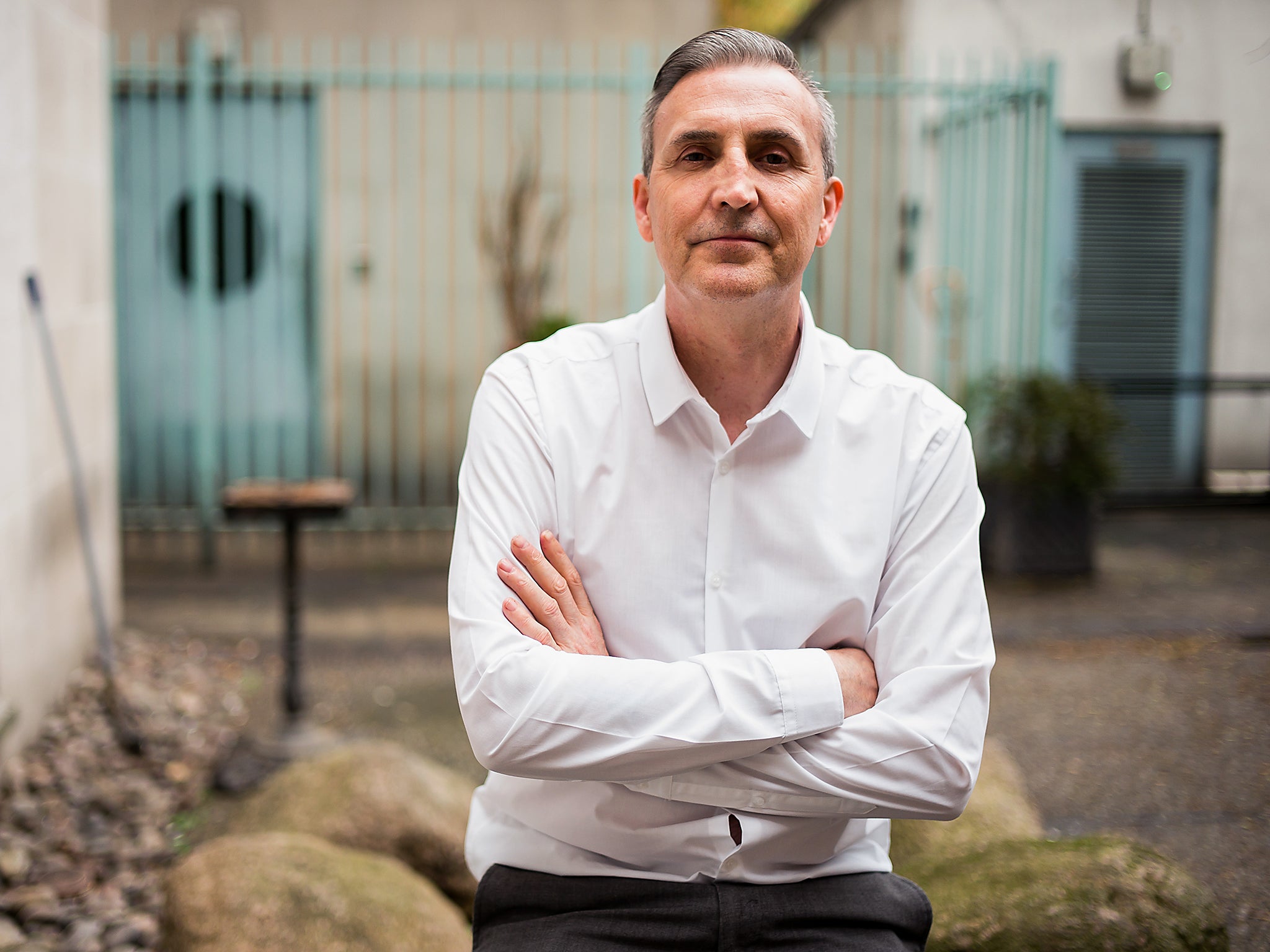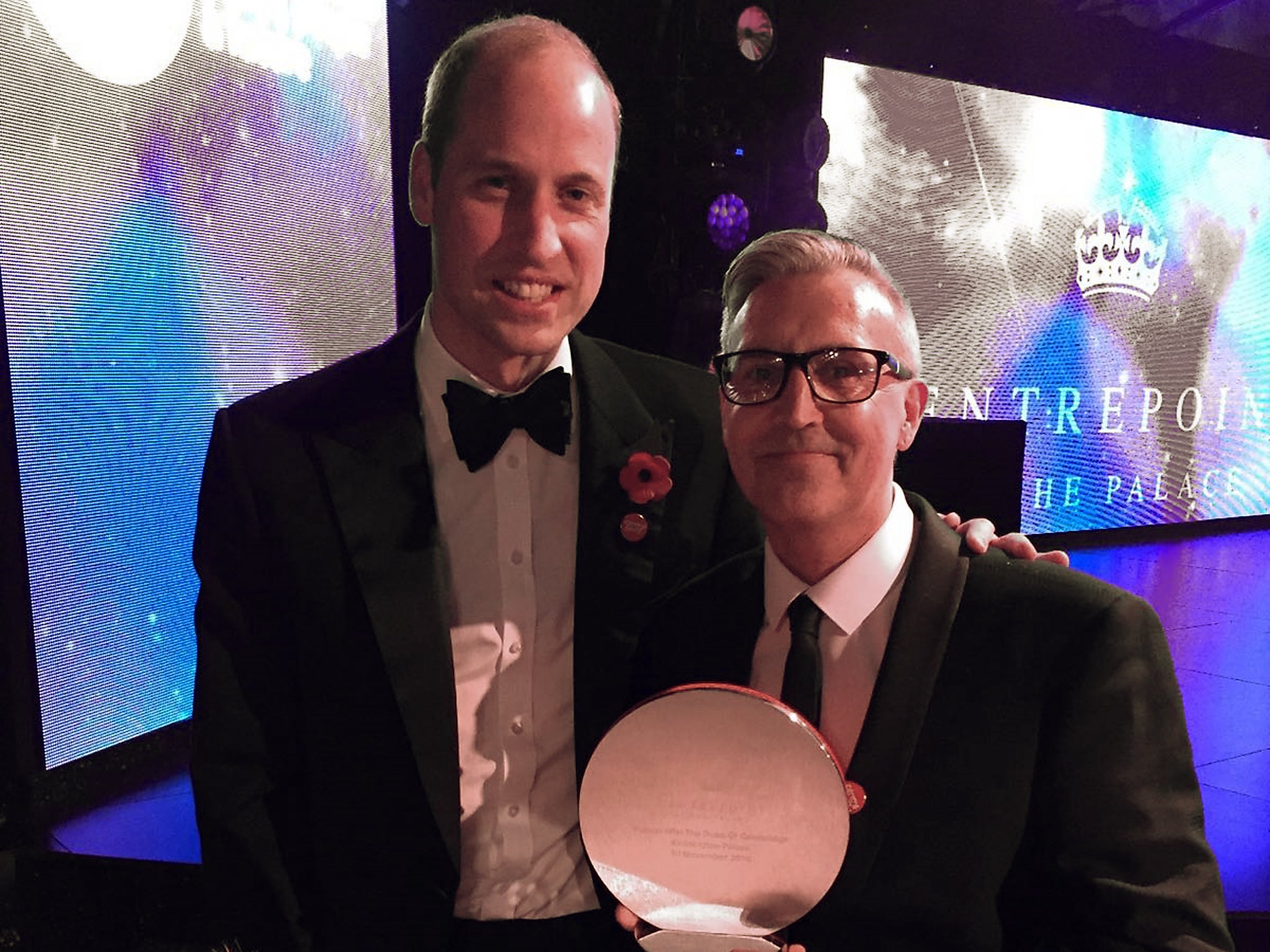‘At 18, you wouldn’t have wanted me anywhere near you’: How a former addict became the father figure of Centrepoint
When Matt Carlisle helps the young homeless at the charity Centrepoint, he knows what they are going through. He’s been there himself.

He shows you round the Centrepoint hostel with an infectious grin, enthusing about everything done for young homeless people, down to the convivial cooking classes where, he finds, kids finally feel relaxed and safe enough to open up about their real problems.
With his Contribution to Society Award, presented by Prince William, Matt Carlisle, 49, is the archetypal well-meaning charity worker – until he turns to look you in the eye and tells you: “Me, when I was 18, you wouldn’t have wanted me anywhere near you.”
If this senior Centrepoint manager seems like a father figure to the young people in the charity’s care, that’s because once, a long time ago, he was one of them – or, to be more honest, like some of the harder cases he now deals with.
He grew up in Manchester, the son of two parents fighting alcohol problems. He got what passed for his education, he says, at “a hard-hitting school” just outside Manchester.
He admits he added to his problems, disobeying his parents, treating life “like a game” taking drugs, acting up and getting drunk at a school that he would leave with no formal qualifications.
By 15, he was a troubled teenager living in Manchester squats. He decided to try his luck down south, and in 1982 headed to Woolwich, south-east London, to live with family members. Within a few weeks, the troubled teenager was kicked out of the Woolwich home. For the next 18 months, he had to fend for himself on the capital’s streets – with little success.
He begged and stayed in squats when he could, as he battled alcohol and drug addiction.
He would self-harm. Waking up with cut hands, in hospital, became almost a regular experience.
“I was absolutely desperate, thinking about ending it,” Mr Carlisle admits. “I thought about taking pills and hoping I wouldn’t wake up. It was a horrible place to be.”
“It’s coming from that place,” he says, “that makes me realise how important the work we do for these young people is and how much support they need.”
If he talks of never meeting bad kids, just kids who never got the breaks, that’s the product not so much of bleeding heart as grim experience.
“I’ve worked with kids who have been murderers, gang members, been shot or have shot people,” Mr Carlisle says. “Kids who are violent, aggressive.
“But if you look in the background, it has all come from there. They are carrying some emotional bricks from a time which has brought them out that way. It’s not just about housing or a job: if you are carrying some memories which have really scarred you then you have got to delve into that to put it back together.
“No one wants to be this aggressive, horrible person,” he adds. “It’s just a matter of giving them the tools to sort out whatever issues there are. As soon as you start giving them better opportunities, they turn it around.”
Mr Carlisle’s own redemption came just before he turned 18, when he was referred to a homeless shelter in Lewisham, south-east London.
The staff there got him back on his feet, got him into an apprenticeship scheme – so successfully that he was able to return as a volunteer to the hostel, which by then had been taken over by Centrepoint.
He has been a front-line worker for the charity ever since. Now he is the regional manager for London and West London, overseeing the support given to hundreds of young people in the capital.

His dedication saw him receive the Contribution to Society Award from the charity’s patron, Prince William, at Centrepoint’s annual awards held at Kensington Palace – although, as Mr Carlisle takes you round a hostel in central London, there is much talk of what “we” do, and far less about what “I” achieve.
It is the system created by Centrepoint and its predecessors that he is emphatic about, especially when it comes to what it did for him.
“Without it,” he says, “I would be dead or in prison.”
Instead, Mr Carlisle has become the man who finds short and long term accommodation for young single parents, young people leaving care and those escaping violence and abuse.
He works with young people to help them access the additional services Centrepoint provides, such as mental health assessments and training that will equip them with the skills they need to live independently and find a career.
“I don’t tell the young people where I have come from unless I need to,” he says, “But sometimes when they are struggling, it is good to be able to say ‘I’ve been where you are and look where I am now’.”
Even so, with youngsters as challenging, or even more challenging than he once was, he admits “It’s no walk in the park.”
Yet Mr Carlisle remains confident of maintaining Centrepoint’s track record of producing positive outcomes with 90 per cent of the young people the charity helps.
He has six children of his own, he says. “If my relationship with any of them broke down and they became homeless, I would want them to come here, to Centrepoint.”
Where he is less confident is with the young homeless people who aren’t referred to Centrepoint or to any sort of help – the one in three who the charity estimates are currently being turned away unaided by English local councils when they seek assistance with homelessness.
Which is why Mr Carlisle thinks the national Young and Homeless Helpline that forms the focus of The Independent’s Christmas charity appeal will prove so essential.
“I think the helpline will uncover maybe 50,000 homeless young people we didn’t even know about because they have never been picked up by the statistics before,” he says. “At the moment the information is so poor at the point of contact.
“Someone who has just become homeless can queue up for six hours to get a list of outdated numbers and be sent back on the street.
“How demoralising is that, when they are so vulnerable? These are people at risk of sexual abuse, drugs, self-harming.
“It is vital we help them.”

How to donate to The Independent’s Christmas Appeal
The Independent’s Homeless Helpline appeal is raising money for the Centrepoint Helpline, a brand new support service that will save young people from ending up on the streets.
To donate you can:
Call
0300 330 2731
Text
HOME66 £5 to 70070
Post
Freepost RTKC-JRGU-ZYGT
Centrepoint
40-42 Phoenix Court
Hawkins Road
Colchester
CO2 8JY
Join our commenting forum
Join thought-provoking conversations, follow other Independent readers and see their replies
Comments
Bookmark popover
Removed from bookmarks